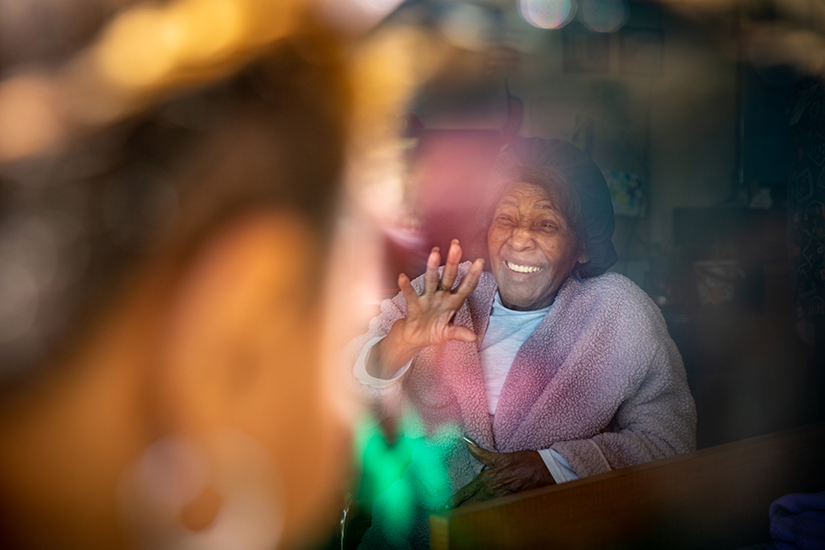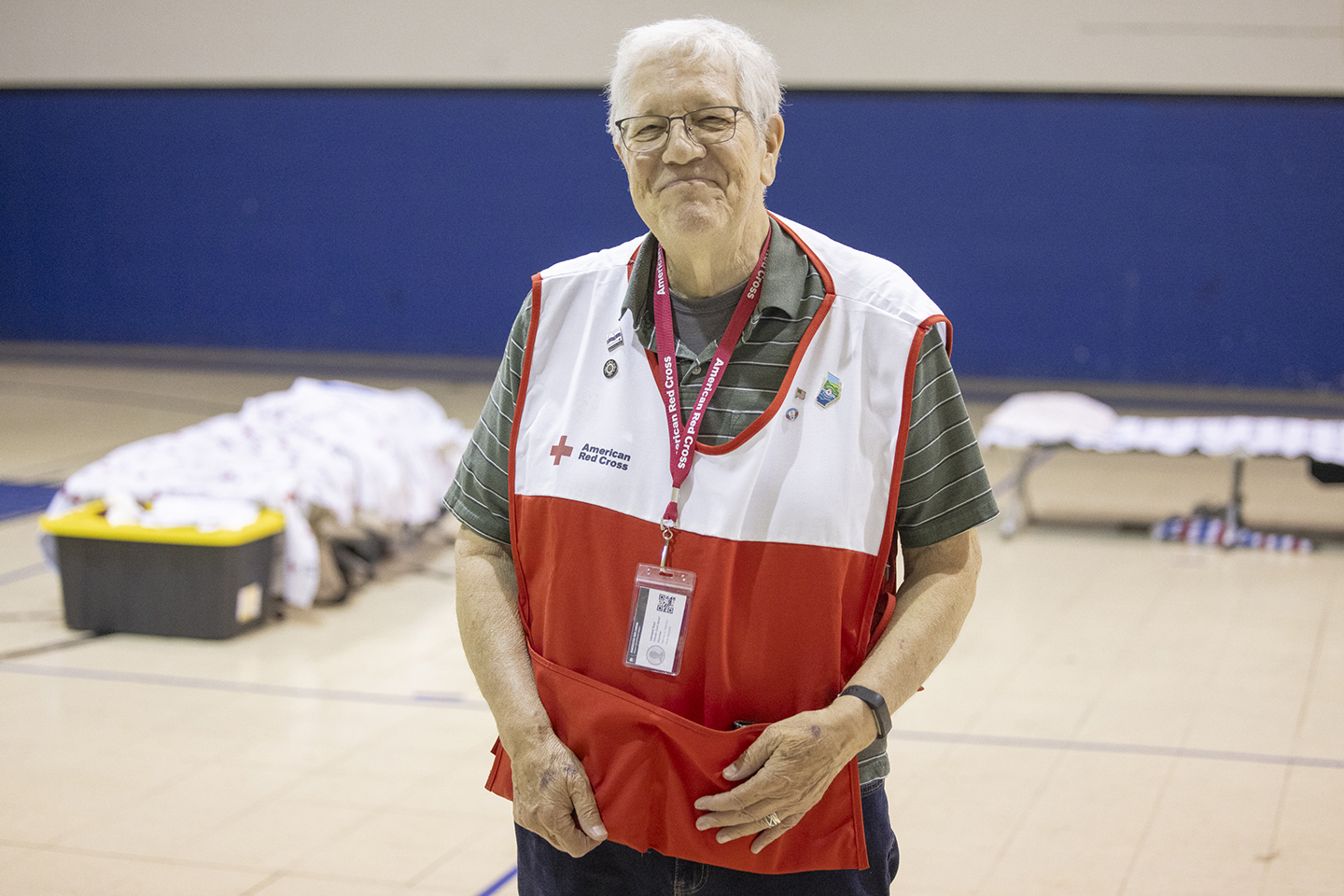Boosting spiritual, emotional strength

Catholic community supports people struggling to cope with isolation
Having sound information is a way to help your mental health during a stressful time, but too much of it can overload you, according to the executive director of Saint Louis Counseling.
When we worry about the unknown, we can be susceptible to bad information, which can make our anxiety worse, said Tom Duff, who heads the Catholic Charities agency. He offers support to people struggling to cope with measures to stop the spread of COVID-19 coronavirus.
He warned against being pulled in by false claims. “Go to the CDC (Centers for Disease Control) or a trusted news source,” Duff said.
Another suggestion is to take a break from the news, perhaps checking it just once a day. “If it’s on all the time, it will induce more panic and a negative outlook,” he said.
Father Daniel White, pastor of St. Francis Xavier (College Church) Parish in Midtown St. Louis, asks people to take care to protect themselves from the spiritual, emotional and psychological effects of “our new normal” as the community seeks to stop the spread of COVID-19 coronavirus.
Greater isolation and social disruption, coupled with a lack of endpoint, make this an “enormous challenge,” Father White wrote on his parish website. “Do all possible to combat feelings of alienation and loneliness. Call, write letters, video chat, and whatever else can help us stay close. Just not literally.”
He also asks people to make prayer a priority. “Each day pray for those who have died, those suffering from illness, and the heroic people caring for the sick,” Father White wrote. “This helps put our own hardships into perspective. Prayer also unites us, even when we cannot be physically near. Praying with Scripture, contemplative prayer, the Rosary, etc. are all wonderful ways for us to be spiritually connected. Make sure on Sunday to participate in our liturgy via YouTube, too.”
Nutrition, proper sleep and exercise remain important during this time, Duff added. Being at home may lead to snacking on unhealthy food, he said.
Establishing a structure with a defined morning and evening routine is important as well, Duff said, especially for children.
Everyone experiences crises differently, he added. “Look at it as an opportunity to get projects done or time with family. Take a different spin.”
He reminds people to lean on their faith as well. And he recommends staying in contact with your parish family in different ways, through a conference call, perhaps.
Duff suggests his agency’s website, saintlouiscounseling.org, as a resource, especially the podcasts on a variety of topics.
And he urges people to check in by phone or other means on others who may be experiencing anxiety due to financial issues, health fears or other reasons. Especially check on someone who is alone, he said, maybe even someone from your parish. “Being alone is really detrimental to people,” he said.
Duff provided further help via a Facebook video at www.bit.ly/33HxjhM.
Help for residents, staff
Myco Wulkopf, a director of pastoral care for Cardinal Ritter Senior Services, provides for the spiritual needs of the residents and staff at Mary, Queen and Mother Center Nursing Facility and Mother of Perpetual Help Assisted Living Facility. She spoke with one of the Mary, Queen and Mother residents who expressed relief after all group activities had been canceled and residents began taking meals in their rooms. The resident viewed the isolation as providing an opportunity to just focus on her spiritual life.
The shutdowns “have forced several Lenten-type practices on all of us,” Wulkopf said. “I’m hoping this time will allow all of us to step back and focus on what is truly important, to bear our crosses patiently and put our trust in God. It has been really hard for everyone, but at the end of the day, we’re forced into focusing on what really matters in our lives.”
Catholics worldwide joined Pope Francis in praying the Rosary on March 19 to ask God to end the coronavirus pandemic, and residents joined in via an intercom system. “Since Mass has been suspended in many places worldwide, praying the Rosary with the whole world felt like a unifying event that we could share as a community together even if we couldn’t physically be together,” Wulkopf said. “The Rosary is a very important devotion for the residents.”
Spiritual programming on the intercom began at 10 a.m. and 3 p.m. daily March 23. The activities department at Mary, Queen and Mother Center leads activities such as bingo over the intercom. Family members stay connected through Face Time, Skype or calling over the phone.
Wulkopf praised the Cardinal Ritter Senior Services staff. “We all just want to make this work, to get through this tough time. ‘Heroic’ just doesn’t say enough. ‘Love’ is the word.”
Her faith, family and residents keep her going. She’s motivated by people who thank her, by laughter and by being reminded that this too shall pass.
Taking care of oneself is of the utmost importance, Wulkopf said, in order to help others.
>> Personal response to stress
Everyone reacts differently to stressful situations. How you respond to the COVID-19 outbreak depends on your background, the things that make you different from other people, and the community you live in.
If you, or someone you care about, are feeling overwhelmed with emotions such as sadness, depression, or anxiety, or feel like you want to harm yourself or others call 911, Substance Abuse and Mental Health Services Administration’s Disaster Distress Helpline: 1-800-985-5990 or text TalkWithUs to 66746. (TTY 1-800-846-8517).
Stress during an infectious disease outbreak can include:
• Fear and worry about your own health and the health of your loved ones
• Changes in sleep or eating patterns
• Difficulty sleeping or concentrating
• Worsening of chronic health problems
• Increased use of alcohol, tobacco or other drugs
People with preexisting mental health conditions should continue with their treatment and be aware of new or worsening symptoms. Additional information can be found at the Substance Abuse and Mental Health Services Administration website.
Things you can do to support yourself:
• Take breaks from watching, reading or listening to news stories, including social media. Hearing about the pandemic repeatedly can be upsetting.
• Take care of your body. Take deep breaths, stretch or meditate. Try to eat healthy, well-balanced meals, exercise regularly, get plenty of sleep and avoid alcohol and drugs.
• Make time to unwind. Try to do some other activities you enjoy.
• Connect with others. Talk with people you trust about your concerns and how you are feeling.
• Call your health care provider if stress gets in the way of your daily activities for several days in a row.
Source: Centers of Disease Control and Prevention
Tips for dealing with stress and anxiety
• Take regular breaks from social media. If you must stay connected, set a designated time during the day to check social media accounts.
• Exercise helps lift the mood. There are many free fitness videos online. Pop Sugar and Fitness Blender are two suggestions; for kids, try GoNoodle on YouTube.
• Add lavender scented epsom salt to a bath or foot soak
• Checking your senses can be helpful if you’re dealing with anxiety. Ask yourself, what are three things I can see, smell, taste, hear and touch right now?
• Make a conscious decision to do the opposite of what you’d do in a moment of anxiety. For example, if you tend to shut down, try some kind of movement. If you tend to isolate, reach out to someone.
• Don Dolindo, a contemporary of Saint Padre Pio, wrote a prayer of surrender. It can be prayed as an entire prayer or as a novena. Read more here: https://bit.ly/3dpEkIE
>> For parents
Children and teens react, in part, on what they see from the adults around them. When parents and caregivers deal with COVID-19 calmly and confidently, they can provide the best support for their children. Parents can be more reassuring to others around them, especially children, if they are better prepared.
Not all children and teens respond to stress in the same way. Some common changes to watch for include:
• Excessive crying or irritation in younger children
• Returning to behaviors they have outgrown (for example, toileting accidents or bedwetting)
• Excessive worry or sadness
• Unhealthy eating or sleeping habits
• Irritability and “acting out” behaviors in teens
• Poor school performance or avoiding school
• Difficulty with attention and concentration
• Avoidance of activities enjoyed in the past
• Unexplained headaches or body pain
• Use of alcohol, tobacco, or other drugs
Supporting children
• Take time to talk with your child or teen about the COVID-19 outbreak. Answer questions and share facts about COVID-19 in a way that your child or teen can understand.
• Reassure your child or teen that they are safe. Let them know it is OK if they feel upset. Share with them how you deal with your own stress so that they can learn how to cope from you.
• Limit your family’s exposure to news coverage of the event, including social media. Children may misinterpret what they hear and can be frightened about something they do not understand.
• Try to keep up with regular routines. If schools are closed, create a schedule for learning activities and relaxing or fun activities.
• Be a role model. Take breaks, get plenty of sleep, exercise, and eat well. Connect with your friends and family members.
• Learn more about helping children cope.
Source: Centers for Disease Control and Prevention







